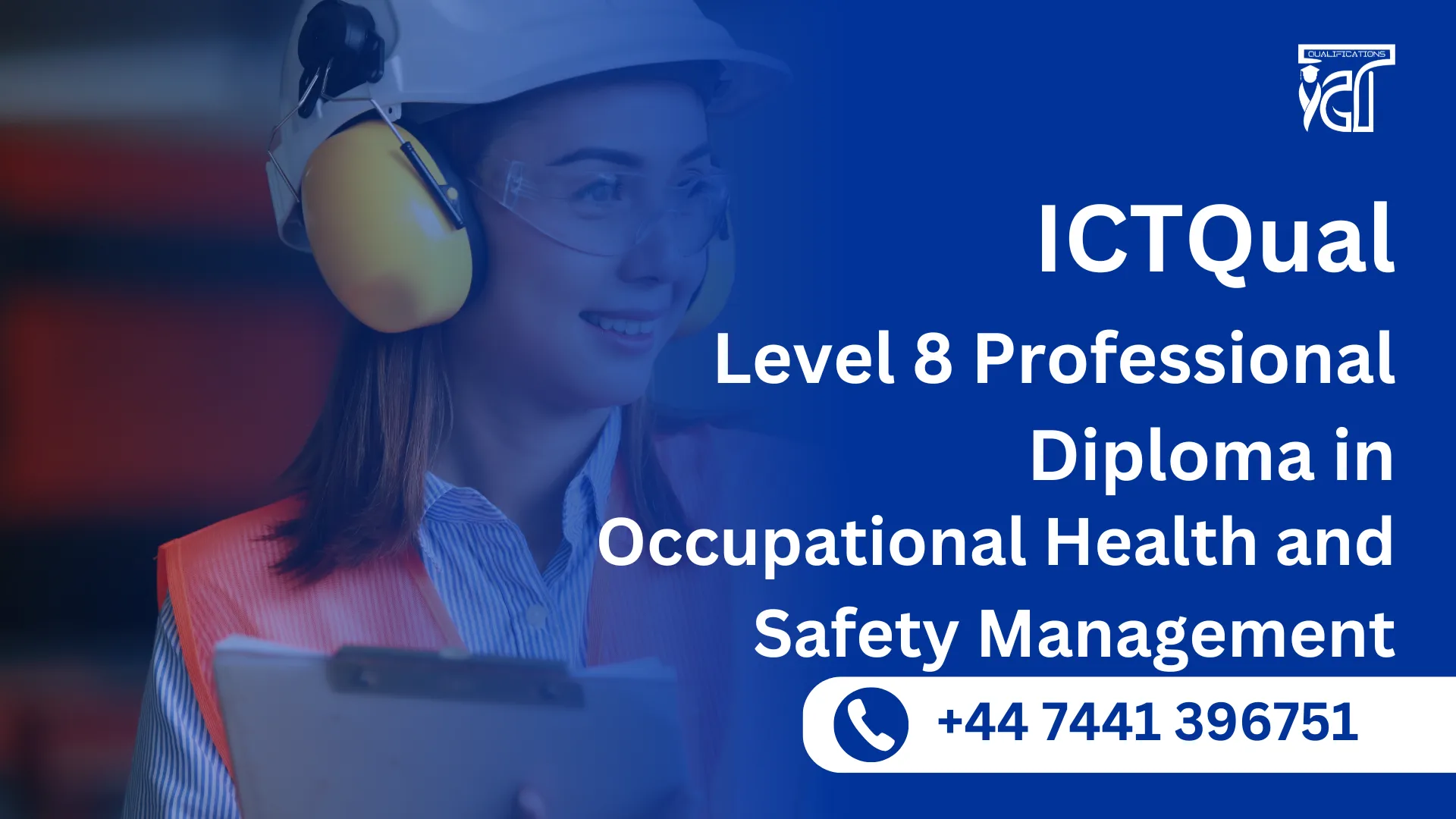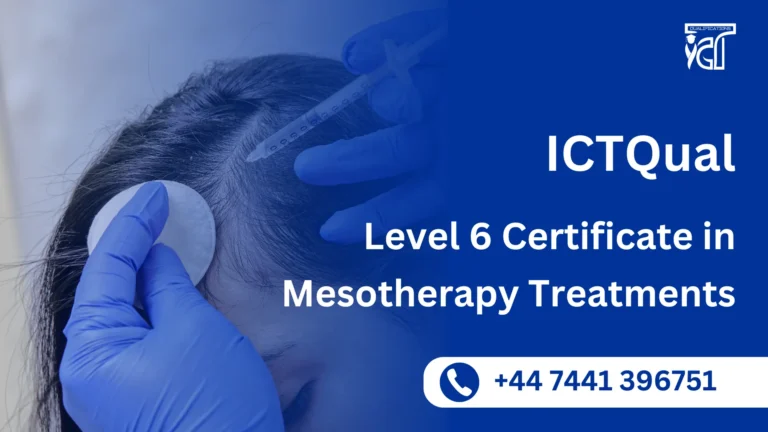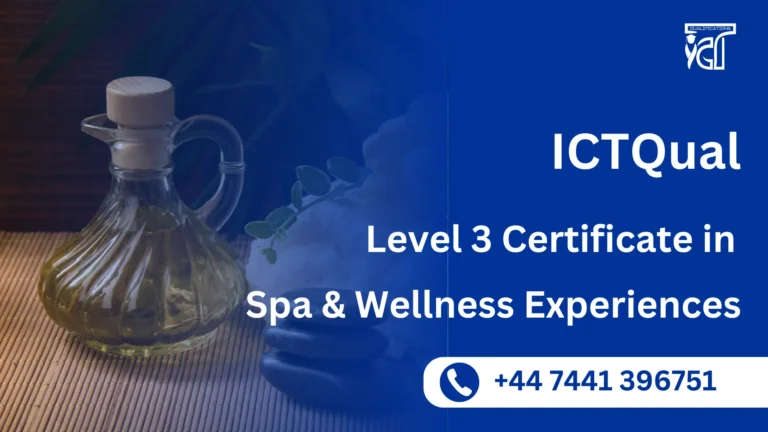In an era where workplace safety is a top priority across every industry, the demand for skilled professionals in occupational health and safety management is growing rapidly. The ICTQual Level 8 Professional Diploma in Occupational Health and Safety Management is a prestigious, Ofqual-regulated, and globally recognised qualification tailored for professionals seeking to lead, design, and implement strategic health and safety frameworks at the highest levels.
This diploma provides a pathway for senior-level health and safety professionals to enhance their expertise, lead sustainable safety initiatives, and ensure legal compliance in complex working environments.
The ICTQual Level 8 Professional Diploma in Occupational Health and Safety Management is an advanced-level qualification equivalent to a doctoral-level credential (RQF Level 8). Designed for experienced HSE professionals, this diploma delivers comprehensive knowledge and practical skills in health and safety leadership, policy development, risk governance, and regulatory compliance.
Delivered through a flexible, 100% assignment-based assessment model, this program is ideal for working professionals who want to study without interrupting their careers. Learners develop strategic insights into managing occupational health, fostering safety cultures, and driving long-term organisational change.
This qualification focuses on enhancing strategic decision-making in occupational health and safety. It combines theory with real-world application, preparing professionals to tackle modern HSE challenges in high-risk sectors such as construction, oil and gas, manufacturing, logistics, and more.
With a strong emphasis on compliance, risk mitigation, and leadership, this diploma empowers learners to make a measurable impact on workplace safety standards and employee well-being.
The ICTQual Level 8 Professional Diploma in Occupational Health and Safety Management is a future-ready qualification designed to equip leaders with the knowledge, credibility, and strategic insight needed to shape safe, compliant, and sustainable workplaces.
Whether you’re aiming to step into executive HSE roles or influence policy on a national or global level, this diploma provides the tools and recognition to elevate your career and create lasting impact.
ICTQual Level 8 Professional Diploma in Occupational Health and Safety Management
The ICTQual Level 8 Professional Diploma in Occupational Health and Safety Management comprises five advanced study units :
- Advanced Risk Management and Assessment
- Legislative and Regulatory Frameworks in Occupational Health and Safety
- Occupational Health and Safety Leadership and Culture
- Incident Investigation and Emergency Response Planning
- Capstone Research in Occupational Health and Safety Management
GLH (Guided Learning Hours) and TQT (Total Qualification Time) are terms commonly used in vocational qualifications to help define the amount of time a learner is expected to spend on their studies.
1. GLH (Guided Learning Hours)
GLH refers to the number of hours a learner spends being directly taught, supervised, or supported during their course. This includes the time spent in activities such as:
- Classroom instruction
- Practical workshops
- One-on-one tutoring or mentoring sessions
- Online learning sessions with tutor support
In other words, GLH represents the time that learners are actively engaged with their instructors or learning activities.
2. TQT (Total Qualification Time)
TQT represents the total amount of time a learner is expected to invest in completing a qualification, including:
- GLH (Guided Learning Hours): Time spent on direct learning, as explained above.
- Self-Directed Learning: This includes time spent on independent study, research, assignment completion, preparation for exams, and any other work the learner does outside of direct teaching hours.
TQT is a broader measure that includes all the time required to achieve the qualification. It helps learners and employers understand the overall commitment required for the qualification.
Key Differences Between GLH and TQT:
- GLH focuses on direct learning with guidance or supervision.
- TQT includes GLH as well as independent study time and other learning-related activities.
Example:
If a qualification has a TQT of 600 hours and a GLH of 250 hours, it means the learner should spend 250 hours in direct learning (classroom, online, or tutor-led sessions) and 350 hours on independent study or research.
The Level 8 Professional Diploma in Occupational Health and Safety Management is designed to equip professionals with advanced skills and knowledge. Upon completion of each study unit and the research project, graduates will be able to demonstrate the following learning outcomes, reflecting the high standards of a Level 8 qualification.
Study Unit 1: Advanced Risk Management and Assessment
Learning Outcomes:
- Critically evaluate and apply advanced risk assessment techniques and methodologies to identify and mitigate workplace hazards.
- Design and implement comprehensive risk management frameworks tailored to diverse industry needs.
- Utilize quantitative and qualitative risk analysis tools to assess and prioritize risks effectively.
- Analyze and interpret complex case studies to develop innovative solutions for managing industry-specific risks.
Study Unit 2: Legislative and Regulatory Frameworks in Occupational Health and Safety
Learning Outcomes:
- Demonstrate an in-depth understanding of international and national health and safety laws and regulations.
- Assess the impact of legislation on organizational policies and procedures, ensuring compliance and best practices.
- Develop and implement strategic plans to align organizational operations with legal and regulatory standards.
- Conduct comparative analyses of global health and safety regulations to inform policy development and implementation.
Study Unit 3: Occupational Health and Safety Leadership and Culture
Learning Outcomes:
- Apply advanced leadership theories and practices to drive health and safety initiatives within organizations.
- Foster and sustain a positive safety culture through effective communication, training, and leadership strategies.
- Analyze the psychological and sociological aspects of workplace safety to enhance employee engagement and compliance.
- Evaluate case studies on successful safety leadership to develop and implement transformative cultural strategies in various organizational contexts.
Study Unit 4: Incident Investigation and Emergency Response Planning
Learning Outcomes:
- Employ advanced techniques for investigating workplace incidents and accidents, identifying root causes, and recommending corrective actions.
- Design and implement robust emergency response and disaster recovery plans tailored to organizational needs.
- Develop crisis management and business continuity strategies to ensure organizational resilience.
- Critically evaluate case studies on major incidents and emergency responses to derive best practices and lessons learned.
Research Project: Capstone Research in Occupational Health and Safety Management
Learning Outcomes:
- Conduct independent research on contemporary issues in occupational health and safety management, contributing to the academic and professional body of knowledge.
- Apply advanced research methodologies and analytical tools to investigate complex problems in the field.
- Develop a comprehensive research proposal, conduct a literature review, and execute data collection and analysis.
- Present research findings and recommendations clearly and effectively, demonstrating expertise in occupational health and safety management.
These learning outcomes ensure that graduates of the Level 8 Professional Diploma in Occupational Health and Safety Management possess the advanced knowledge and skills necessary to excel in senior roles within the industry.
Benefits of ICTQual Level 8 Professional Diploma in Occupational Health and Safety Management
Contributes to Safer Workplaces
Empowers professionals to build safer, healthier, and more sustainable working environments with measurable impact.
Globally Recognized Qualification
This diploma is Ofqual-regulated and respected internationally, making it valuable for career opportunities across multiple countries and industries.
Doctorate-Level Academic Rigor
As an RQF Level 8 qualification, it demonstrates the highest level of professional competence in occupational health and safety management.
100% Assignment-Based Assessment
No exams required—this course is designed for working professionals who prefer a flexible, practical learning approach focused on real-world application.
Leadership Development
Builds strategic leadership and decision-making skills necessary for senior roles such as HSE Director, Global Safety Manager, or Chief Risk Officer.
Compliance and Regulatory Expertise
Equips learners with in-depth knowledge of international safety regulations, legal frameworks, and compliance strategies.
Enhanced Career Prospects
Opens doors to high-level roles in health and safety across sectors such as construction, oil & gas, manufacturing, government, and logistics.
Cross-Industry Relevance
Skills and knowledge gained are applicable in both public and private sectors, and in high-risk as well as corporate environments.
Support for Professional and Academic Growth
Provides a strong foundation for progression into doctoral research, policy development, or high-impact consultancy roles.
Real-World Focus
Emphasizes practical implementation of HSE strategies, incident investigation, and cultural transformation in workplace safety.
Best Fit for ICTQual Level 8 Professional Diploma in Occupational Health and Safety Management
The ICTQual Level 8 Professional Diploma in Occupational Health and Safety Management is specifically designed for senior professionals who are responsible for shaping and leading health and safety strategies at an organisational or governmental level.
This advanced qualification is best suited for:
- Health and Safety Managers and Directors
Professionals already working in senior HSE roles who aim to move into executive leadership positions or global HSE consultancy. - Corporate Compliance and Risk Officers
Individuals responsible for developing, implementing, or overseeing compliance frameworks, risk assessments, and internal audits across business units. - HSE Consultants and Advisors
Experts offering strategic safety solutions to organisations across industries and looking to formalise their expertise with a Level 8 qualification. - Government and Regulatory Officials
Policy makers and regulatory professionals involved in setting and enforcing occupational health and safety standards. - Sustainability and Safety Executives
Leaders integrating occupational health and safety with broader sustainability, ESG, and corporate social responsibility strategies. - Academic and Research Professionals
Those engaged in health and safety research, training, or higher education, and seeking a formal doctorate-level credential. - Industry Professionals in High-Risk Sectors
Senior personnel in industries such as oil & gas, construction, manufacturing, transportation, and mining, where advanced HSE leadership is essential.
Entry Requirements
Register Now
Qualification Process
Qualification Process for the ICTQual Level 8 Professional Diploma in Occupational Health and Safety Management
- Self-Assessment:
Begin by evaluating your eligibility to ensure you meet the qualification requirements, including work experience, knowledge, and language proficiency. - Registration:
Complete your registration by submitting the required documents, including a scanned copy of a valid ID, and paying the registration fee. - Induction:
An assessor will conduct an induction to confirm your eligibility for the course and explain the evidence requirements. If you do not meet the criteria, your registration will be canceled, and the fee will be refunded. - Assignmnets & Evidence Submission:
Provide all assignmnets and the necessary evidence based on the assessment criteria outlined in the course. If you are unsure of the required evidence, consult with the assessor for guidance on the type and nature of evidence needed. - Feedback and Revision:
The assessor will review your submitted evidence and provide feedback. Evidence that meets the criteria will be marked as “Criteria Met,” while any gaps will be identified. You will be asked to revise and resubmit if needed. - Competence Evidence:
Submit final evidence demonstrating that all learning outcomes have been met. This evidence will be marked as “Criteria Met” by the assessor once it is satisfactory. - Internal Quality Assurance (IQA):
The Internal Quality Assurance Verifier (IQA) will review your evidence to ensure consistency, quality, and compliance with standards. - External Verification:
The IQA will submit your portfolio to ICTQUAL AB External Quality Assurance Verifiers (EQA) for final confirmation. The EQA may contact you directly to verify the authenticity of your evidence. - Certification:
Upon successful completion of all checks, ICTQUAL AB will issue your official certificate, confirming that you have attained the ICTQual Level 8 Professional Diploma in Occupational Health and Safety Management.







